Tuesday, December 29, 2009 9:11:28 AM
MAMA-86 Drinking Water Campaign
SUSTAINABLE DEVELOPMENT INTERNATIONAL
ANNA GOLUBOVSKA-ONISIMOVA, Director of MAMA-86, Ukraine
http://www.p2pays.org/ref/40/39737.pdf
ABSTRACT
Ukraine, one of the New Independent States with a territory of 603 700 square kilometres and a population of about 50 million, is located in the
centre of Europe. With regard to water resources available for use, Ukraine belongs to the group of water limited countries. In dry years there are 670 m3 of river runoff per capita. Unequal distribution of water resources in terms of space and time throughout Ukraine makes water supply problems more complicated. Surface water is the main source of supply of drinking water. Approximately 60% of the population is supplied from the Dnieper River, 15% from other surface waters and 25% from groundwater (particularly in rural areas).
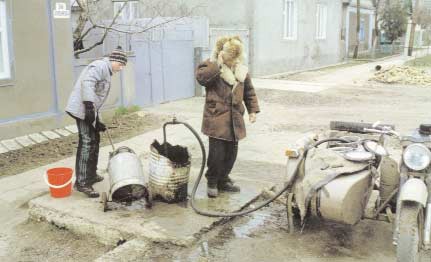
Figure 1 (above)
Collection of water for home use
As a result of a long period of administrative-command economic system development, the water resources of Ukraine have suffered from considerable anthropogenic pressure with subsequent deterioration. Basins of the main Ukrainian rivers are polluted, sometime severely, by nitrogen
substances, oil products, phenols and heavy metals. The quality of surface water in Ukraine is in general too poor for drinking purposes.
During the transitional period of last 10 years in Ukraine, the economic constraints coupled with fundamental political and administrative changes have prevented the maintenance and extension of water and sewerage infrastructure. Reduced investment and decreasing activities have led to changes in polluting inputs, disruption of water supply and sanitation services, and disruption of pollution control. In general the situation in the water and sewage sector can be identified as a crisis. The quality of drinking water is significant in determining the complexity of social and health problems in Ukraine. In 1997 MAMA-86, an Environmental NGO in Ukraine initiated consultations on water problems. Quality of drinking water was identified by MAMA-86
network’s member organisations as a key issue for action. We brought together community activists from different parts of the country with representatives of main stakeholders’ groups and government to facilitate an integrated approach to finding a solution. From this network four organisations from different regions of Ukraine have started a campaign on drinking water. Today the water campaign is run by MAMA-86 Kyiv,
‘Vidrodzhennia’ Tatarbunary, MAMA-86 Odessa, MAMA-86 Artemivsk, ‘Gaia’ Sebastopol. Women’s environmental groups from Mariupol, Kharkiv, Yaremche,
Ternopil and Nizhin are also joining the campaign. The short term goals of MAMA-86 drinking water campaign are to:
- monitor drinking water quality and survey public opinion;
-raise public awareness about the issues and provide information;
-stimulate the cooperation and debates between different sectors;
-exchange already existing good practices from Ukraine and overseas;
-conduct pilot projects aimed at improving drinking water quality and rational water use;
-use international events to promote participation, consultation and partnership.
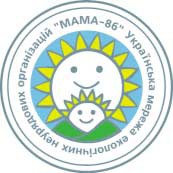
Figure 2
MAMA-86 logo
Long term goals of the Campaign are to:
-build public pressure for a change in water policy;
-activate the public and local governments to take action;
-promote the ideas of sustainable water use;
-involve the public in the decision-making process;
-build a public platform to lobby the national and local governments.
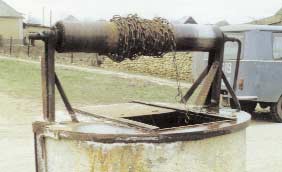
Figure 3
Conditions of water supply
The basic activities of Mama-86 drinking water campaign are informational and educational, as well as implementation of pilot projects. There is no tradition in Ukraine of disclosure of information and it is difficult for the public to obtain clear information from official sources. However, the public needs the information about water quality; about practical steps to improve water quality which can be taken to protect themselves and their families from health risks associated with inadequate water. MAMA-86 undertakes their own independent tests on tap water quality and surveys public attitudes and habits regarding drinking water. The results of tap water analysis have shown the specifics of drinking water quality in cities
of Kyiv and Odessa and the towns of Tatarbunary and Artemivsk, which reflect the state of pollution of water sources and the low level of water treatment. The main conclusions of the survey made in co-operation with Socis-Gallup International in 11 cities and towns of Ukraine were that 64% of respondents perceived drinking water quality as a major environmental problem, 15.6% considered that a large-scale public awareness campaign would be necessary,
21.3% believed that they had to rely on their own devices to improve water quality: many citizens interviewed agree to pay more, if the quality of drinking water were to be guaranteed. This is especially important now, when pricing of water becomes the primary issue and the majority of the
Ukrainian population has very low income. The quality of drinking water and consumers’ concern about it are key factors which can help to influence the
citizens’ and environmental consciousness of the population in order to preserve water resources in Ukraine.
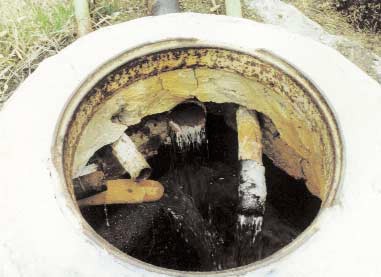
Figure 4
Rusting and disintegrating pipes
The MAMA-86 Network plays an intermediary role between the public and the Government at local and national levels to develop dialogue on water problems, to find practical solutions and help people towards a better future. According to the Aarhus Convention (ratified in 1999 in Ukraine) the public should be involved by the State in the decision-making process at the earliest stages. The implementation of this Convention in Ukraine should include the mechanisms of active environmental information provision by the State to the population, as well as the involvement of the population into the environmental decision making process, on water use in particular. The MAMA-86 Network actively works on gathering and wide distribution of information on the water problems and the decision-making processes on environmental issues. There are many educational lectures; seminars and meetings are going on, articles and materials being published, radio and TV programmes produced on drinking water problems in the framework of MAMA-86 water campaign. We are sure that drinking water is the key issue for the building of democracy in our society. The popularisation of sustainable development and democracy-building principles with a focus on water resources management is very effective because the problems of quality of drinking water supply are very understandable as they are directly linked to people’s life, performance and health. Due to the absence of state obligatory permanent environmental education, lack of awareness-raising policy and lack of economical regulative instruments, individual consumers have had no motivation to participate in the protection of water resources and economical use of them. The objective of the MAMA-86 informational-educational campaign is to revive the feeling of citizens’ ownership and their understanding of personal responsibility for national resources which are our rivers and ponds. The goal is to educate not only a rational consumer but also mainly an active citizen who becomes the main factor of sustainable development programme implementation. On 22 and 23 February 2000 MAMA-86 held the seminar ‘Basic principals of sustainable water use in Ukraine and the role of NGOs in preparation to the World Water Forum’. About 100 participants took active part in the seminar, among them: 26 Government officials, 19 experts and representatives of 25 NGOs from nine regions of Ukraine The implementation of sustainable development principles in management, protection and use of water resources is urgent and a vital matter for Ukraine. Today the idea of sustainable resources is not reflected in public opinion, national and local programmes, or State policy and economic performance. However, the idea of sustainable development is close to and understandable for Ukrainian environmental NGOs. It was the ‘green’ movement, determined by the Chernobyl accident, which resulted in important political changes and the establishment of independent Ukraine. But Ukraine needs State political will and consecutive actions for the implementation of the sustainable development concept. Development of partnerships between the Government and other sectors of the society (business, science, industry, trade unions, NGOs and public) is an obligatory precondition to solve the problems of sustainable development and to introduce the practice of sustainable water use. Several important documents were the outcome of the seminar: NGO Position Paper ‘Basic principles of Sustainable Water Use in Ukraine’, ‘NGO recommendations to the Government’, ‘Government recommendations to NGOs’, linked to popularisation and promotion of the sustainable development. One of the outcomes of the seminar was the decision to hold public hearings on new drinking water legislation. MAMA-86 has co-ordinated the NGOs’ input into the new draft law, and we are going ahead with including in the new drinking water legislation the right for access to safe drinking water in adequate supply, as well as mechanisms for public participation on the monitoring and improvement of this law. In the framework of the drinking water campaign MAMA-86 network implements the pilot projects on different practical solutions of drinking water problems at the local level.
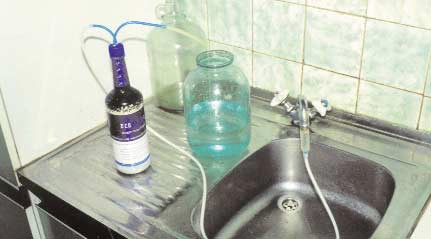
Figure 5 (top)
Water purification device
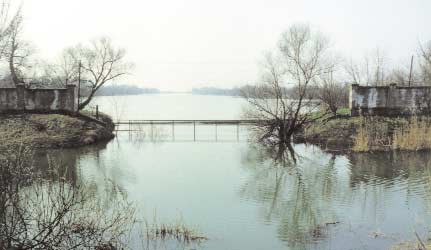
Figure 6 (above)
Odessa: intake channel at the water supply station
At present, in Ukraine 25% of water treatment facilities have reached their expiry date, 22% of water pipelines are in state of emergency, 35% are worn out and inadequate. 45% of the population of Ukraine is consuming water which is below the quality standards adopted at the beginning of 1980. The health of the population in Ukraine is in a critical state; therefore small-scaled, short-term alternative solutions for the supply of safe drinking water to people today is an extremely urgent and important task. Exchange of knowledge and experience on positive solutions of ecological problems (water pilot projects, in particular) and on citizens’ role in implementing it are of the great importance for catalysing public activity. Nongovernmental organisations should develop and increase the number of such pilot projects. Development of rational water use among citizens is one of the important goals of the MAMA-86 drinking water campaign. It is important to note that during the former Soviet Union’s time the concept of endless water resources prevailed. The payment for water resources never corresponded to the real value. Yet, the cost of water is not realistic and not transparent. To compare: in the Netherlands, 1 cubic metre costs for the individual user up to 1.5 USD, whereas the same in Ukraine costs not more than 10 cents. Economical instruments are developing very slowly in Ukraine, while overuse of drinking water exceeds national standards (300 litres per person per day) by an average of 2–3 times, and 5–6 times the standards of EU countries. Ukrainian Government has declared market reforms in Ukraine. The private sector is becoming involved step-bystep in municipal services operations. That is why the attitude to water has to start changing at the political, administrative, legislative and consumer levels as soon as possible.
SEBASTOPOL
In 1999 MAMA-86 initiated an international project on the reconstruction of Sebastopol City Infectious Diseases Hospital. The state of water supply, sewerage and heating systems of the Hospital are in a state of emergency. The Hospital’s wastewater is insufficiently treated and contains
pathogenic micro-organisms, a dangerous source of pollution to underground water and open sea. The Tebodin consulting firm conducted a technical
investigation (in June-July 1999) of the situation, resulting in a priority listing and first cost estimate for the reconstruction works. A local building firm is now conducting the construction work. NOVIB funded 90% of the project’s budget. To develop the feeling of ownership among citizens of Sebastopol, MAMA-86 partner ‘Gaia’ has started a broad informational campaign in order to raise funds for and to involve local people, authorities and other interested parties into the Hospital reconstruction work.
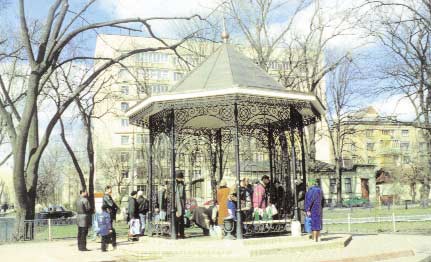
Figure 7
Secondary treated water
ARTEMIVSK
In Artemivsk, the MAMA-86 partner has actively lobbied the local authorities to implement the City Programme on Drinking Water Supply till 2002. MAMA-86, together with major stakeholders, has prepared recommendations on: treatment plant reconstruction; putting into operation artesian wells in the town; and the production of bottled drinking water. The additional measures on drinking water improvement and finance building (8% of the town’s budget) were adopted by the local authorities. In 1999, three town enterprises producing bottled drinking water were put into operation.
TATARBUNARY
In Tatarbunary, as a result of the MAMA-86 campaign, regional partners have received a drinking water purification device, which supplies the kindergarten with safe drinking water. This deal has activated local authorities. They have decided to buy two more devices to supply safe water to kindergartens and schools.
ODESSA
Odessa’s MAMA-86 partner is actively developing their activity on rational water use. They have found that there is a 2.3–3.6 times excess of water use in Luzanivka district (about 10 000 inhabitants). The main reasons for such losses are leakages in water supply system and irrational water use. Due to public activities the local administration has conducted repairs of taps, pipes and overflow systems in apartments. Based on the data obtained, a leaflet on water saving was published and distributed in this area. This experience is broadly used in MAMA-86’s educational work. The MAMA-86 regional group in Odessa took action to provide consumers with information on the quality of commercially supplied drinking water. As the quality of tap drinking water drops, the spontaneous development of alternative systems for drinking water supply is becoming a real problem. The volunteers of the ‘Drinking Water’ project in Odessa have conducted a public inspection of 98 commercial additional purified water units. The results obtained were delivered to the State Sanitary Supervision Organs. After the second government inspection 10 units were closed. The results and valid information on the situation with additionally purified water were presented in the leaflet ‘What the consumer of additionally purified water must know’. This information contributed to
the debates on legislation and technology aspects of alternative solutions for safe drinking water supply. In December 1999 the regional group of MAMA-86-
Odessa held a seminar on additional water purification problems. All the participants represented Odessa’s water business. The experts on water purification and relevant regulations informed the business community about the requirements as to the quality of additionally purified water
and the new technologies. The participants considered this seminar as highly informative and constructive.
CONCLUSIONS
Environmental NGOs play a significant role in the implementation of sustainable water use principals, making it real. But NGOs shouldn’t replace the National and Local Governments in their duties. Also, when we are talking about an integrated approach to water management, this integration should not be cooked as a mixture. Structured mechanisms of performance and the true partnership of the different players are based on clearly identified duties
and rights of those involved. Participation is the key word for the strategy to achieve sustainable water, although the roles of different participants should be specified. However, as for participating consumers – they should be citizens, first of all. The consumer is taking care only of his/ her tap
water, while the citizen is taking care of the river where the water is coming from, and what will happen to the water after use. This is a challenge while introducing new NIS economical instruments in water management, including water meters, to promote the connection of these instruments
to the environment, health and well-being; and educate citizens about it. The Governments should make better use of NGOs’ information capacity and their experience to educate people about water sector reforms. We need people to understand the basic principles of ecosystem approach in water management. As water is vital to the life of each person on Earth, we believe that global thinking of people, needed for sustainable development, will be developed exactly via thoughts about water – blue gold of the Planet.
ABOUT THE AUTHOR

Anna Golubovska-Onisimova is a cofounder and acting director of MAMA-86 environmental NGO in Kyiv, Ukraine. She is 36 now, married, mother of 2 children. Anna graduated from the National Academy of Arts in 1987, where she trained as an architect, but since 1990, she has become more and more involved
with environmental NGO activities. Anna participated in a large number of international projects and conferences, including UN CSD–2, CSD–5 and CSD–6, UN Women’s Conference in Beijing in 1995, and a number of regional meetings organised by UN ECE. She is a Board member of ANPED (Northern Alliance for
Sustainability), ECO Forum (Pan-European Coalition of Environmental Citizen’s Organizations) and Women in Europe for a Common Future. Since April 1999, she has been the associate of LEAD (Leadership for the Environment and Development) International programme.
IF YOU HAVE ANY ENQUIRIES REGARDING THE CONTENT OF THIS ARTICLE, PLEASE CONTACT:
Anna Golubovska-Onisimova
Director MAMA-86 Environmental NGO
22 Michailivska str.
Kyiv-1 01001
Ukraine
Tel: +380 44 228 7749
Fax: +380 44 229 5514
E-mail: mama86@gluk.org
Web site: www.mama-86.kiev.ua
================================================
Commentary by funmaxus: The above website shown defaults to:
http://rozvitokrus.ru/ which appears to be printed in Ukraine. Use Google Translate to convert the website into English.
SUSTAINABLE DEVELOPMENT INTERNATIONAL
ANNA GOLUBOVSKA-ONISIMOVA, Director of MAMA-86, Ukraine
http://www.p2pays.org/ref/40/39737.pdf
ABSTRACT
Ukraine, one of the New Independent States with a territory of 603 700 square kilometres and a population of about 50 million, is located in the
centre of Europe. With regard to water resources available for use, Ukraine belongs to the group of water limited countries. In dry years there are 670 m3 of river runoff per capita. Unequal distribution of water resources in terms of space and time throughout Ukraine makes water supply problems more complicated. Surface water is the main source of supply of drinking water. Approximately 60% of the population is supplied from the Dnieper River, 15% from other surface waters and 25% from groundwater (particularly in rural areas).

Figure 1 (above)
Collection of water for home use
As a result of a long period of administrative-command economic system development, the water resources of Ukraine have suffered from considerable anthropogenic pressure with subsequent deterioration. Basins of the main Ukrainian rivers are polluted, sometime severely, by nitrogen
substances, oil products, phenols and heavy metals. The quality of surface water in Ukraine is in general too poor for drinking purposes.
During the transitional period of last 10 years in Ukraine, the economic constraints coupled with fundamental political and administrative changes have prevented the maintenance and extension of water and sewerage infrastructure. Reduced investment and decreasing activities have led to changes in polluting inputs, disruption of water supply and sanitation services, and disruption of pollution control. In general the situation in the water and sewage sector can be identified as a crisis. The quality of drinking water is significant in determining the complexity of social and health problems in Ukraine. In 1997 MAMA-86, an Environmental NGO in Ukraine initiated consultations on water problems. Quality of drinking water was identified by MAMA-86
network’s member organisations as a key issue for action. We brought together community activists from different parts of the country with representatives of main stakeholders’ groups and government to facilitate an integrated approach to finding a solution. From this network four organisations from different regions of Ukraine have started a campaign on drinking water. Today the water campaign is run by MAMA-86 Kyiv,
‘Vidrodzhennia’ Tatarbunary, MAMA-86 Odessa, MAMA-86 Artemivsk, ‘Gaia’ Sebastopol. Women’s environmental groups from Mariupol, Kharkiv, Yaremche,
Ternopil and Nizhin are also joining the campaign. The short term goals of MAMA-86 drinking water campaign are to:
- monitor drinking water quality and survey public opinion;
-raise public awareness about the issues and provide information;
-stimulate the cooperation and debates between different sectors;
-exchange already existing good practices from Ukraine and overseas;
-conduct pilot projects aimed at improving drinking water quality and rational water use;
-use international events to promote participation, consultation and partnership.

Figure 2
MAMA-86 logo
Long term goals of the Campaign are to:
-build public pressure for a change in water policy;
-activate the public and local governments to take action;
-promote the ideas of sustainable water use;
-involve the public in the decision-making process;
-build a public platform to lobby the national and local governments.

Figure 3
Conditions of water supply
The basic activities of Mama-86 drinking water campaign are informational and educational, as well as implementation of pilot projects. There is no tradition in Ukraine of disclosure of information and it is difficult for the public to obtain clear information from official sources. However, the public needs the information about water quality; about practical steps to improve water quality which can be taken to protect themselves and their families from health risks associated with inadequate water. MAMA-86 undertakes their own independent tests on tap water quality and surveys public attitudes and habits regarding drinking water. The results of tap water analysis have shown the specifics of drinking water quality in cities
of Kyiv and Odessa and the towns of Tatarbunary and Artemivsk, which reflect the state of pollution of water sources and the low level of water treatment. The main conclusions of the survey made in co-operation with Socis-Gallup International in 11 cities and towns of Ukraine were that 64% of respondents perceived drinking water quality as a major environmental problem, 15.6% considered that a large-scale public awareness campaign would be necessary,
21.3% believed that they had to rely on their own devices to improve water quality: many citizens interviewed agree to pay more, if the quality of drinking water were to be guaranteed. This is especially important now, when pricing of water becomes the primary issue and the majority of the
Ukrainian population has very low income. The quality of drinking water and consumers’ concern about it are key factors which can help to influence the
citizens’ and environmental consciousness of the population in order to preserve water resources in Ukraine.

Figure 4
Rusting and disintegrating pipes
The MAMA-86 Network plays an intermediary role between the public and the Government at local and national levels to develop dialogue on water problems, to find practical solutions and help people towards a better future. According to the Aarhus Convention (ratified in 1999 in Ukraine) the public should be involved by the State in the decision-making process at the earliest stages. The implementation of this Convention in Ukraine should include the mechanisms of active environmental information provision by the State to the population, as well as the involvement of the population into the environmental decision making process, on water use in particular. The MAMA-86 Network actively works on gathering and wide distribution of information on the water problems and the decision-making processes on environmental issues. There are many educational lectures; seminars and meetings are going on, articles and materials being published, radio and TV programmes produced on drinking water problems in the framework of MAMA-86 water campaign. We are sure that drinking water is the key issue for the building of democracy in our society. The popularisation of sustainable development and democracy-building principles with a focus on water resources management is very effective because the problems of quality of drinking water supply are very understandable as they are directly linked to people’s life, performance and health. Due to the absence of state obligatory permanent environmental education, lack of awareness-raising policy and lack of economical regulative instruments, individual consumers have had no motivation to participate in the protection of water resources and economical use of them. The objective of the MAMA-86 informational-educational campaign is to revive the feeling of citizens’ ownership and their understanding of personal responsibility for national resources which are our rivers and ponds. The goal is to educate not only a rational consumer but also mainly an active citizen who becomes the main factor of sustainable development programme implementation. On 22 and 23 February 2000 MAMA-86 held the seminar ‘Basic principals of sustainable water use in Ukraine and the role of NGOs in preparation to the World Water Forum’. About 100 participants took active part in the seminar, among them: 26 Government officials, 19 experts and representatives of 25 NGOs from nine regions of Ukraine The implementation of sustainable development principles in management, protection and use of water resources is urgent and a vital matter for Ukraine. Today the idea of sustainable resources is not reflected in public opinion, national and local programmes, or State policy and economic performance. However, the idea of sustainable development is close to and understandable for Ukrainian environmental NGOs. It was the ‘green’ movement, determined by the Chernobyl accident, which resulted in important political changes and the establishment of independent Ukraine. But Ukraine needs State political will and consecutive actions for the implementation of the sustainable development concept. Development of partnerships between the Government and other sectors of the society (business, science, industry, trade unions, NGOs and public) is an obligatory precondition to solve the problems of sustainable development and to introduce the practice of sustainable water use. Several important documents were the outcome of the seminar: NGO Position Paper ‘Basic principles of Sustainable Water Use in Ukraine’, ‘NGO recommendations to the Government’, ‘Government recommendations to NGOs’, linked to popularisation and promotion of the sustainable development. One of the outcomes of the seminar was the decision to hold public hearings on new drinking water legislation. MAMA-86 has co-ordinated the NGOs’ input into the new draft law, and we are going ahead with including in the new drinking water legislation the right for access to safe drinking water in adequate supply, as well as mechanisms for public participation on the monitoring and improvement of this law. In the framework of the drinking water campaign MAMA-86 network implements the pilot projects on different practical solutions of drinking water problems at the local level.

Figure 5 (top)
Water purification device

Figure 6 (above)
Odessa: intake channel at the water supply station
At present, in Ukraine 25% of water treatment facilities have reached their expiry date, 22% of water pipelines are in state of emergency, 35% are worn out and inadequate. 45% of the population of Ukraine is consuming water which is below the quality standards adopted at the beginning of 1980. The health of the population in Ukraine is in a critical state; therefore small-scaled, short-term alternative solutions for the supply of safe drinking water to people today is an extremely urgent and important task. Exchange of knowledge and experience on positive solutions of ecological problems (water pilot projects, in particular) and on citizens’ role in implementing it are of the great importance for catalysing public activity. Nongovernmental organisations should develop and increase the number of such pilot projects. Development of rational water use among citizens is one of the important goals of the MAMA-86 drinking water campaign. It is important to note that during the former Soviet Union’s time the concept of endless water resources prevailed. The payment for water resources never corresponded to the real value. Yet, the cost of water is not realistic and not transparent. To compare: in the Netherlands, 1 cubic metre costs for the individual user up to 1.5 USD, whereas the same in Ukraine costs not more than 10 cents. Economical instruments are developing very slowly in Ukraine, while overuse of drinking water exceeds national standards (300 litres per person per day) by an average of 2–3 times, and 5–6 times the standards of EU countries. Ukrainian Government has declared market reforms in Ukraine. The private sector is becoming involved step-bystep in municipal services operations. That is why the attitude to water has to start changing at the political, administrative, legislative and consumer levels as soon as possible.
SEBASTOPOL
In 1999 MAMA-86 initiated an international project on the reconstruction of Sebastopol City Infectious Diseases Hospital. The state of water supply, sewerage and heating systems of the Hospital are in a state of emergency. The Hospital’s wastewater is insufficiently treated and contains
pathogenic micro-organisms, a dangerous source of pollution to underground water and open sea. The Tebodin consulting firm conducted a technical
investigation (in June-July 1999) of the situation, resulting in a priority listing and first cost estimate for the reconstruction works. A local building firm is now conducting the construction work. NOVIB funded 90% of the project’s budget. To develop the feeling of ownership among citizens of Sebastopol, MAMA-86 partner ‘Gaia’ has started a broad informational campaign in order to raise funds for and to involve local people, authorities and other interested parties into the Hospital reconstruction work.

Figure 7
Secondary treated water
ARTEMIVSK
In Artemivsk, the MAMA-86 partner has actively lobbied the local authorities to implement the City Programme on Drinking Water Supply till 2002. MAMA-86, together with major stakeholders, has prepared recommendations on: treatment plant reconstruction; putting into operation artesian wells in the town; and the production of bottled drinking water. The additional measures on drinking water improvement and finance building (8% of the town’s budget) were adopted by the local authorities. In 1999, three town enterprises producing bottled drinking water were put into operation.
TATARBUNARY
In Tatarbunary, as a result of the MAMA-86 campaign, regional partners have received a drinking water purification device, which supplies the kindergarten with safe drinking water. This deal has activated local authorities. They have decided to buy two more devices to supply safe water to kindergartens and schools.
ODESSA
Odessa’s MAMA-86 partner is actively developing their activity on rational water use. They have found that there is a 2.3–3.6 times excess of water use in Luzanivka district (about 10 000 inhabitants). The main reasons for such losses are leakages in water supply system and irrational water use. Due to public activities the local administration has conducted repairs of taps, pipes and overflow systems in apartments. Based on the data obtained, a leaflet on water saving was published and distributed in this area. This experience is broadly used in MAMA-86’s educational work. The MAMA-86 regional group in Odessa took action to provide consumers with information on the quality of commercially supplied drinking water. As the quality of tap drinking water drops, the spontaneous development of alternative systems for drinking water supply is becoming a real problem. The volunteers of the ‘Drinking Water’ project in Odessa have conducted a public inspection of 98 commercial additional purified water units. The results obtained were delivered to the State Sanitary Supervision Organs. After the second government inspection 10 units were closed. The results and valid information on the situation with additionally purified water were presented in the leaflet ‘What the consumer of additionally purified water must know’. This information contributed to
the debates on legislation and technology aspects of alternative solutions for safe drinking water supply. In December 1999 the regional group of MAMA-86-
Odessa held a seminar on additional water purification problems. All the participants represented Odessa’s water business. The experts on water purification and relevant regulations informed the business community about the requirements as to the quality of additionally purified water
and the new technologies. The participants considered this seminar as highly informative and constructive.
CONCLUSIONS
Environmental NGOs play a significant role in the implementation of sustainable water use principals, making it real. But NGOs shouldn’t replace the National and Local Governments in their duties. Also, when we are talking about an integrated approach to water management, this integration should not be cooked as a mixture. Structured mechanisms of performance and the true partnership of the different players are based on clearly identified duties
and rights of those involved. Participation is the key word for the strategy to achieve sustainable water, although the roles of different participants should be specified. However, as for participating consumers – they should be citizens, first of all. The consumer is taking care only of his/ her tap
water, while the citizen is taking care of the river where the water is coming from, and what will happen to the water after use. This is a challenge while introducing new NIS economical instruments in water management, including water meters, to promote the connection of these instruments
to the environment, health and well-being; and educate citizens about it. The Governments should make better use of NGOs’ information capacity and their experience to educate people about water sector reforms. We need people to understand the basic principles of ecosystem approach in water management. As water is vital to the life of each person on Earth, we believe that global thinking of people, needed for sustainable development, will be developed exactly via thoughts about water – blue gold of the Planet.
ABOUT THE AUTHOR

Anna Golubovska-Onisimova is a cofounder and acting director of MAMA-86 environmental NGO in Kyiv, Ukraine. She is 36 now, married, mother of 2 children. Anna graduated from the National Academy of Arts in 1987, where she trained as an architect, but since 1990, she has become more and more involved
with environmental NGO activities. Anna participated in a large number of international projects and conferences, including UN CSD–2, CSD–5 and CSD–6, UN Women’s Conference in Beijing in 1995, and a number of regional meetings organised by UN ECE. She is a Board member of ANPED (Northern Alliance for
Sustainability), ECO Forum (Pan-European Coalition of Environmental Citizen’s Organizations) and Women in Europe for a Common Future. Since April 1999, she has been the associate of LEAD (Leadership for the Environment and Development) International programme.
IF YOU HAVE ANY ENQUIRIES REGARDING THE CONTENT OF THIS ARTICLE, PLEASE CONTACT:
Anna Golubovska-Onisimova
Director MAMA-86 Environmental NGO
22 Michailivska str.
Kyiv-1 01001
Ukraine
Tel: +380 44 228 7749
Fax: +380 44 229 5514
E-mail: mama86@gluk.org
Web site: www.mama-86.kiev.ua
================================================
Commentary by funmaxus: The above website shown defaults to:
http://rozvitokrus.ru/ which appears to be printed in Ukraine. Use Google Translate to convert the website into English.
Not compensated in any manner for research and/or posts. Information should be construed as information only for discussion purposes. Always conduct your own dd. Just my opinion
Join the InvestorsHub Community
Register for free to join our community of investors and share your ideas. You will also get access to streaming quotes, interactive charts, trades, portfolio, live options flow and more tools.









